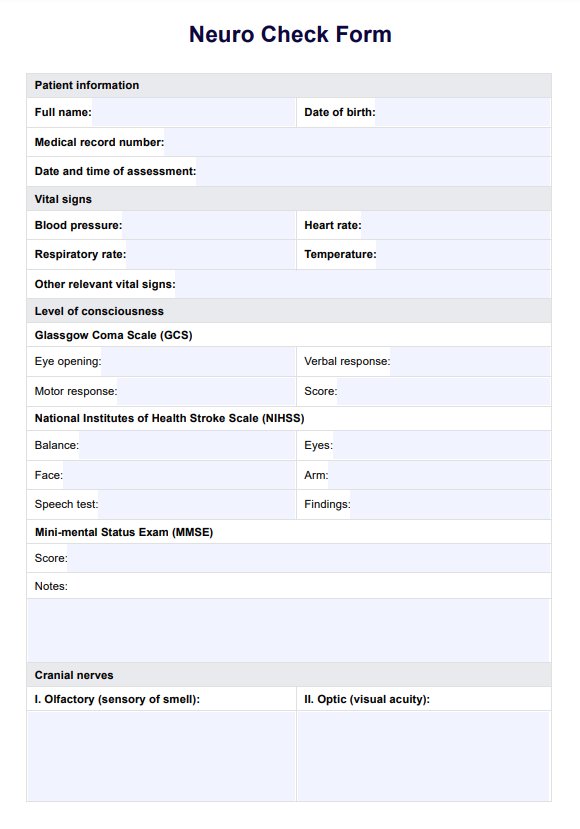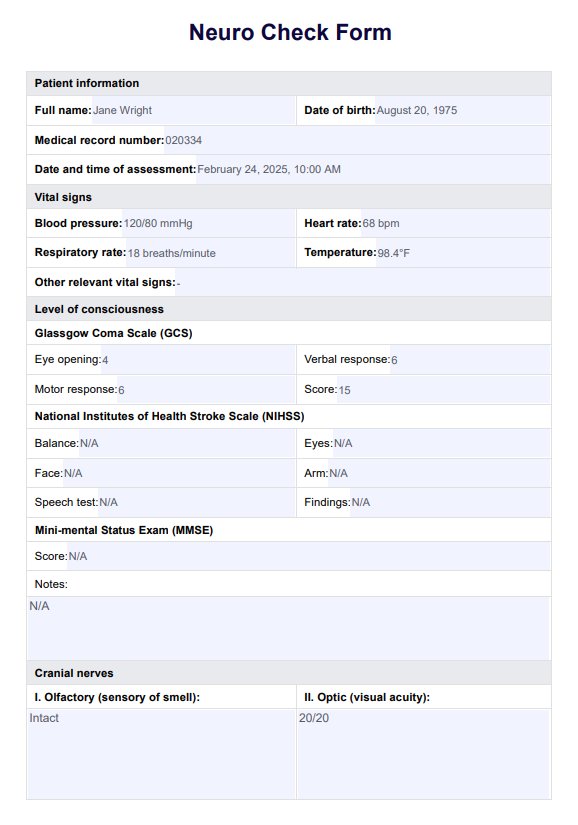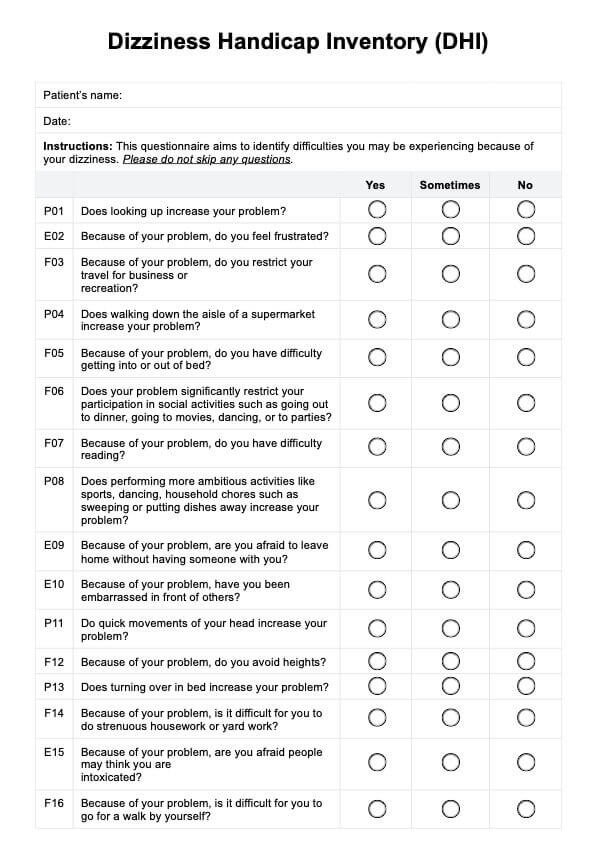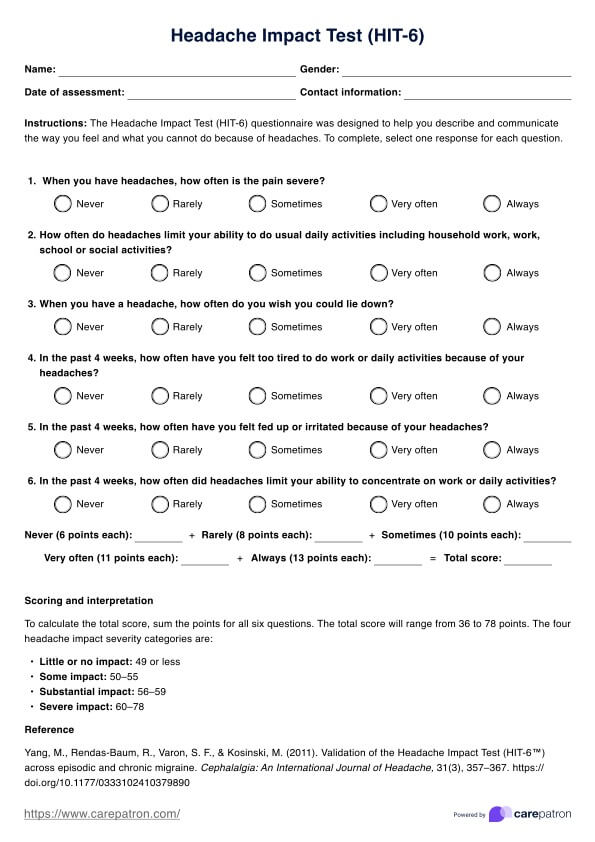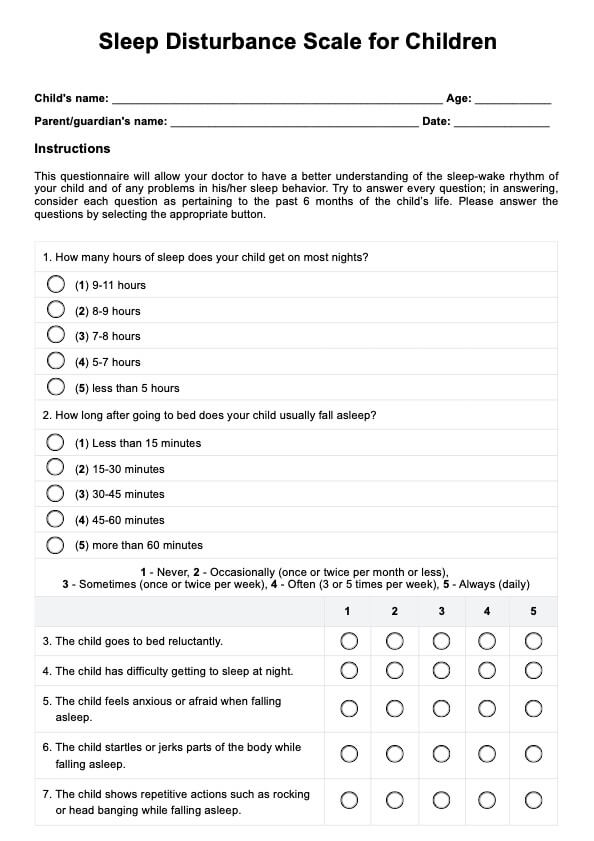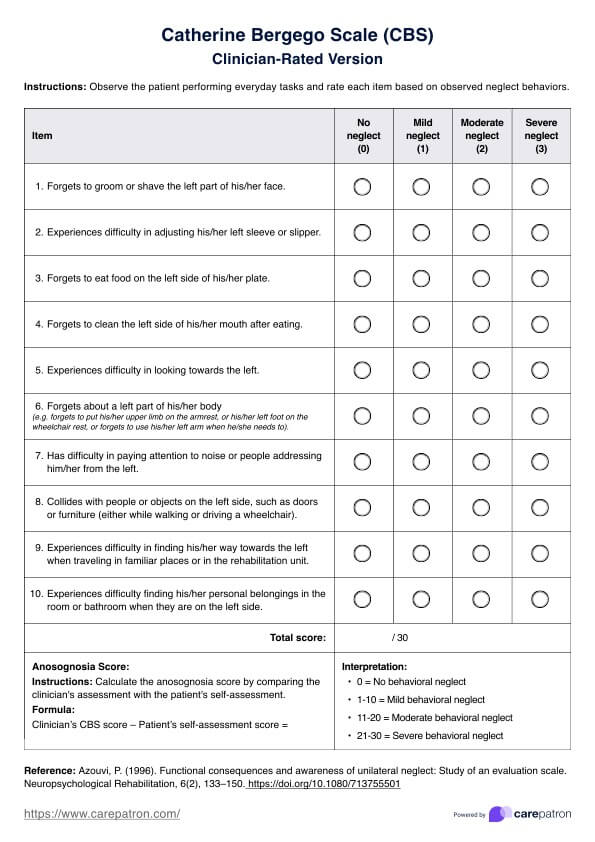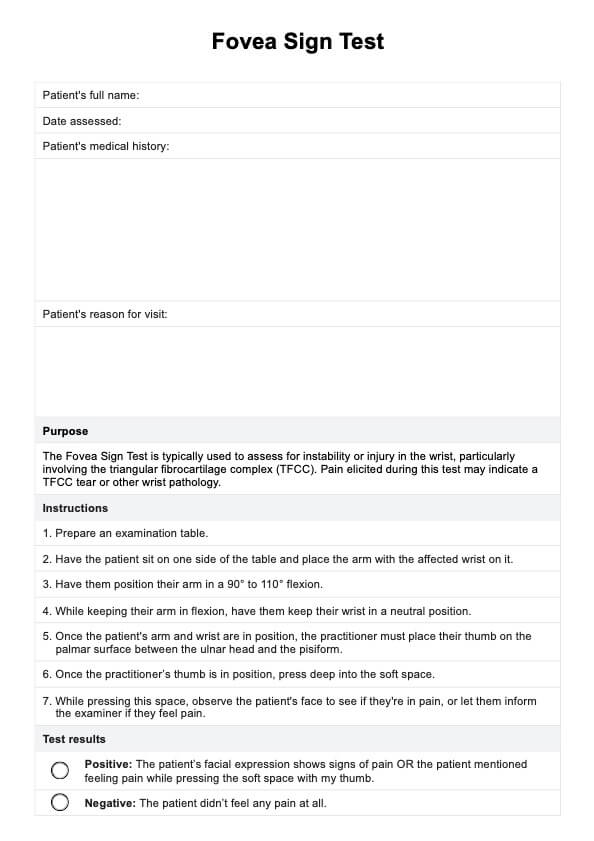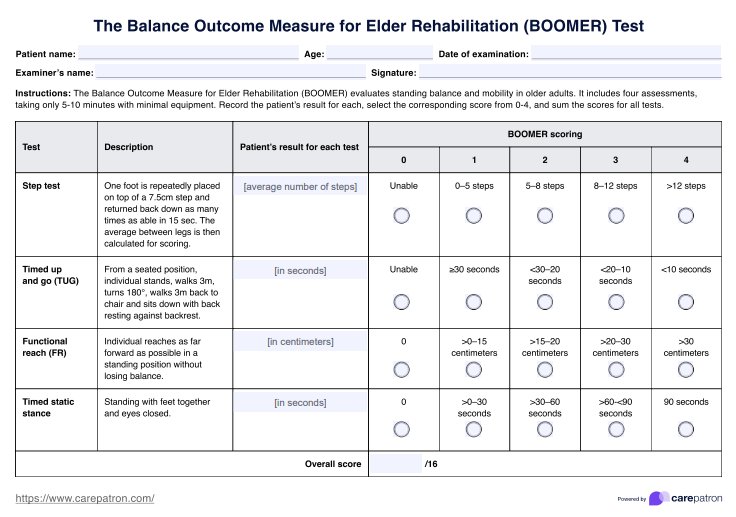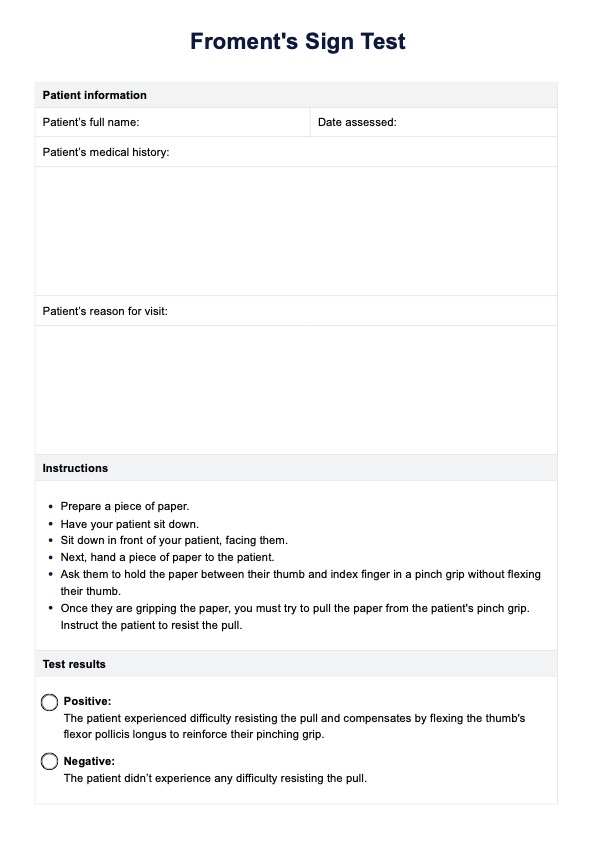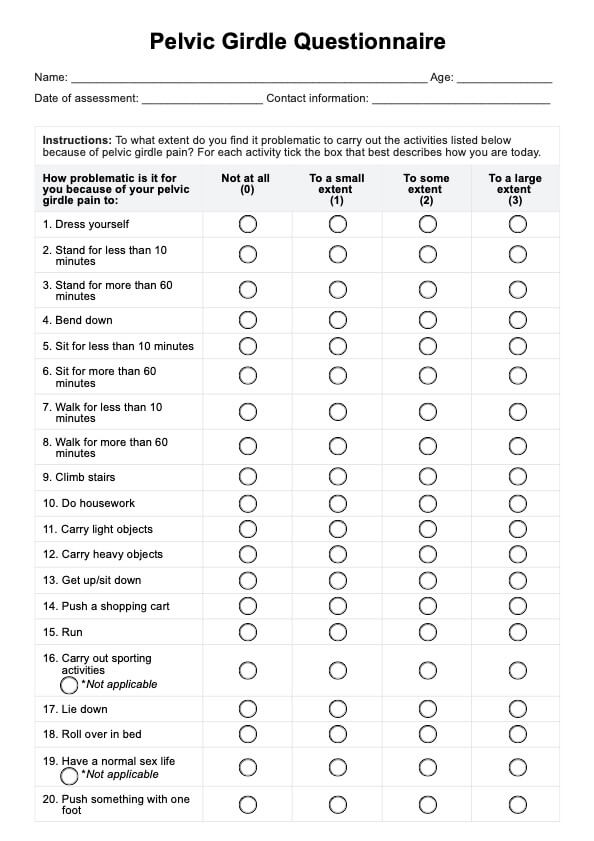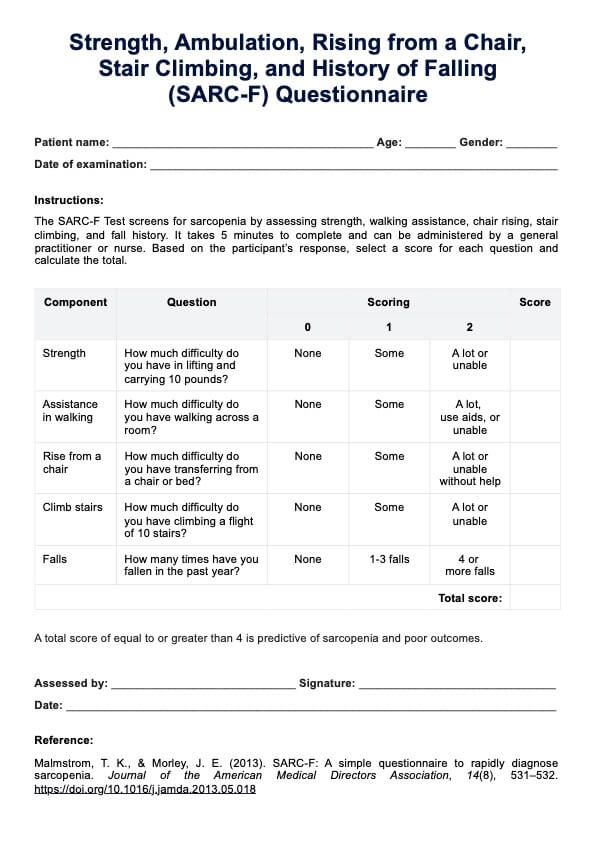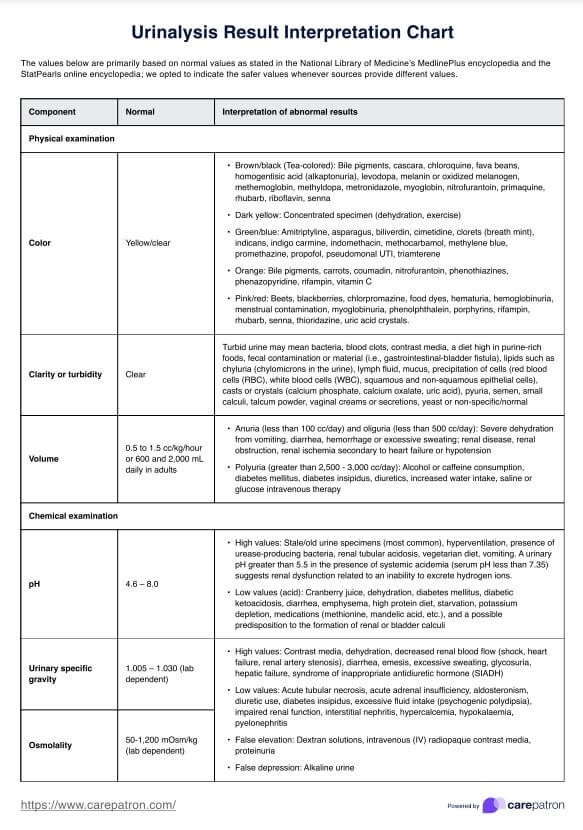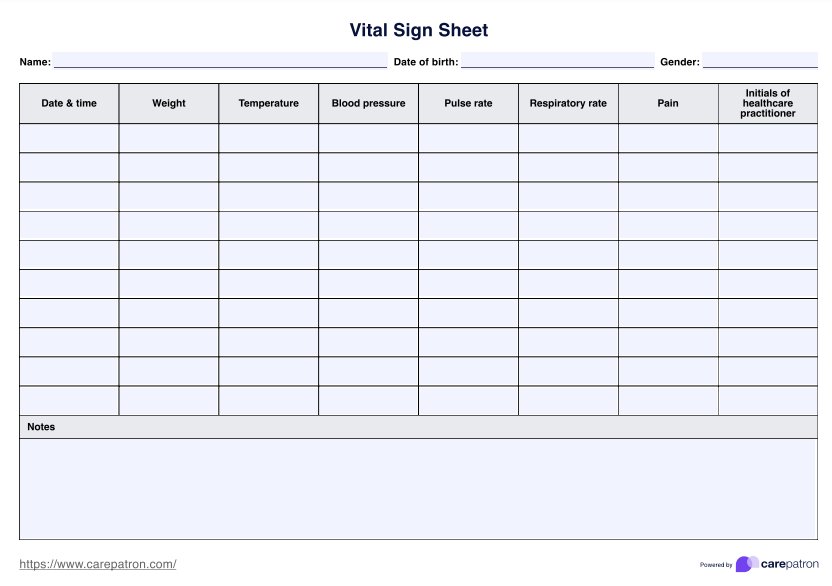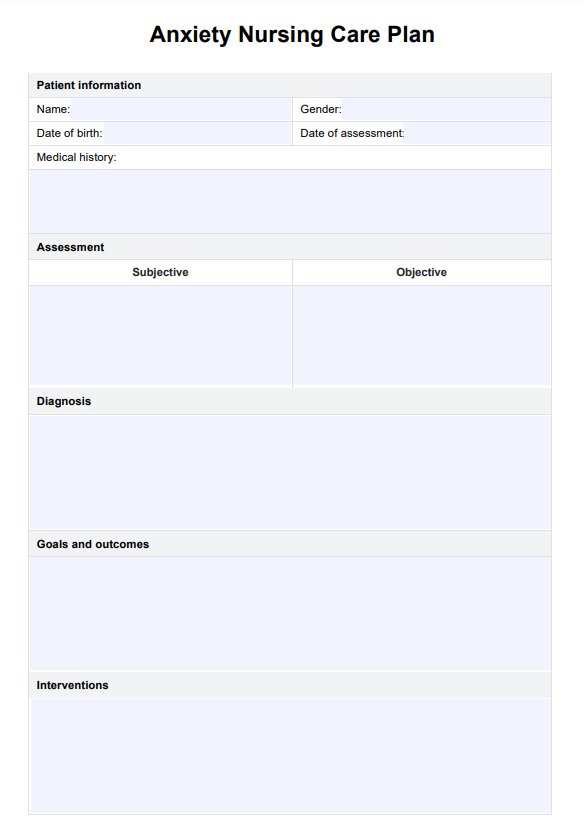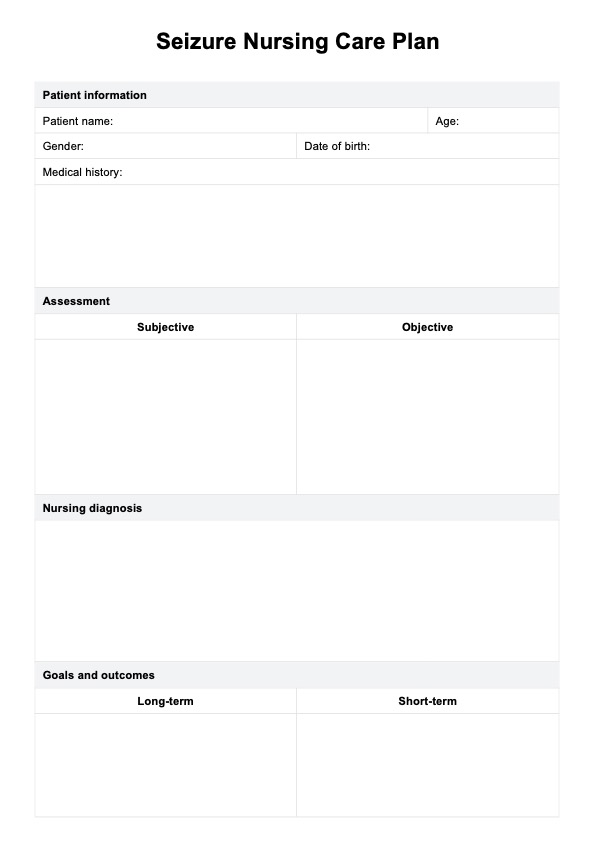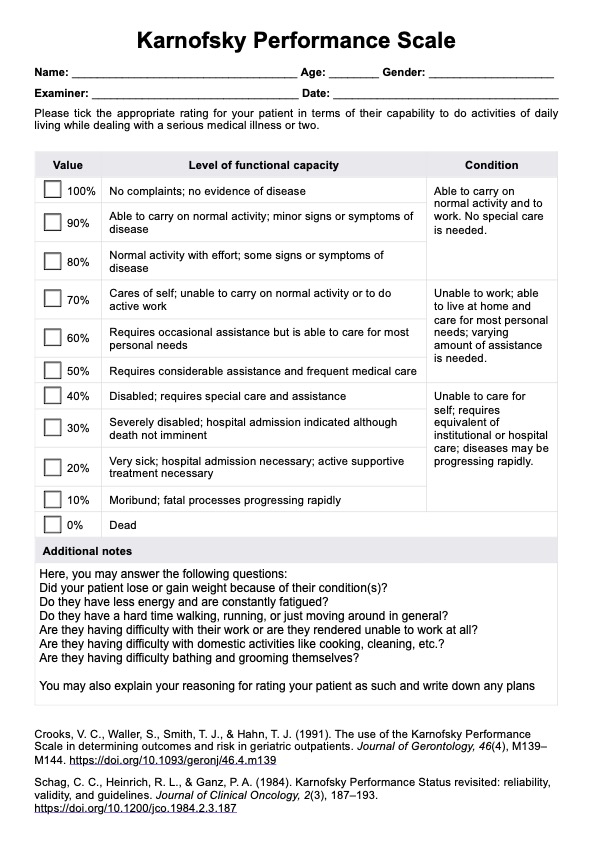Neuro Check Form
Master the Neuro Check Form with our essential guide. Learn easy steps to complete it online and ensure accurate assessments.


What is a neuro check?
A neuro check of the central nervous system is crucial to assessing a patient's mental status and overall health. This comprehensive examination evaluates various aspects, including neurological status, motor and sensory skills, cranial nerves, and vital signs. The neuro check aims to thoroughly understand a patient's neurological condition, helping healthcare professionals identify any abnormalities or signs of potential issues related to the brain and spinal cord.
A Neuro Check Form or neurological flow sheet is common in healthcare settings, providing a structured and organized approach to documenting the patient's neurological status. This printable neuro check sheet or neurological assessment flow sheet allows healthcare providers to record vital signs, assess motor function, and monitor sensory function efficiently.
Neuro Check Form Template
Neuro Check Form Example
How does this Neuro Check Form work?
After obtaining a copy of our free printable neuro check sheet, here are the steps you can take to make the most out of the template when conducting a neuro check:
Access the Neuro Check Form template
Click on "Use template" to access and customize this form within the Carepatron platform, or click "Download" for a fillable PDF copy.
Patient information
Collect essential patient details such as name, date of birth, medical record number, and the date/time of assessment to ensure accurate identification and documentation.
Vital signs
Record the patient's vital signs, including blood pressure, heart rate, respiratory rate, and temperature, providing a baseline understanding of their physiological status.
Level of consciousness
Utilize the Glasgow Coma Scale (GCS) to assess the patient's responsiveness, including eye-opening, verbal, and motor responses. The cumulative score provides an objective measure of consciousness. Also, use the National Institutes of Health Stroke Scale (NIHSS) to assess stroke severity and neurological functioning when applicable.
Mental status
Evaluate the patient's mental clarity, orientation to person, place, and time, and responses to verbal and painful stimuli, offering insights into their cognitive functioning.
Motor function
Assess muscle strength in both upper and lower extremities using a standardized scale. Conduct coordination exams, such as rapid alternating movements and the finger-to-nose test, to evaluate fine motor skills.
Sensory examination
Test the patient's bilateral response to light touch and painful stimuli, providing information about their sensory perception and responsiveness.
Cranial nerve assessment
Systematically evaluate each cranial nerve, from cranial nerve I, cranial nerve II, cranial nerve III, all the way to cranial nerve XII, checking for normal functioning in smells, visual acuity, eye movements, facial expressions, hearing, and balance.
Reflexes
Assess deep tendon reflexes using a standardized scale, including the biceps, triceps, brachioradialis, patellar, and Achilles reflexes. Evaluate the plantar reflex for signs of neurological integrity.
Other observations
Document pupillary responses, checking for size, equality, and reactivity to light. Note any abnormal movements, posturing, or signs of focal cortical functioning.
Next steps
Once you have completed the printable Neuro Check Form, several crucial next steps are essential to ensure comprehensive patient care and appropriate management. These next steps include analyzing the results, planning or initiating appropriate interventions, monitoring patients, and continuously evaluating the patient's response to treatment so that adjustments may be made if needed.
When should you use this template?
A Neuro Check Form is typically used in various healthcare settings to assess and document a patient's neurological status. Instances where this is useful include hospital admissions, post-surgery, post-traumatic injuries, suspected stroke or neurological events, changes in mental status, monitoring chronic neurological conditions, emergencies, and changes in condition that may signify a problem with neurological functioning.
Using the Medical Record Template ensures comprehensive and organized documentation of patient histories and treatments. Incorporating the Neuro Exam Template allows for detailed and systematic neurological assessments, identifying any neurological deficits or changes. The Glasgow Coma Scale Template provides a standardized method to assess a patient's level of consciousness, which is crucial for monitoring patients with head injuries or other conditions affecting consciousness.
Interpreting the results of the neuro check
Interpreting the results of a neuro check involves a thorough assessment of various aspects to understand the patient's neurological condition. The examination covers mental status, motor function, sensory responses, coordination, cranial nerves, reflexes, and other observations.
A regular evaluation indicates alertness, orientation, and appropriate responses to stimuli in basic neurological assessment of mental status. Any deviations may signal cognitive issues. Motor function evaluations identify strength and coordination, with weaknesses or lack of coordination pointing to potential nervous system dysfunction.
Sensory examinations help detect abnormalities in the sensory system or the perception of touch and pain, revealing potential nerve damage or dysfunction. Assessing cranial nerves offers insights into specific neurological functions, while reflex examinations detect signs of hyperreflexia or hyporeflexia, indicating potential motor neuron issues.
Observations related to vision responses, abnormal movements, or signs of focal cortical functioning contribute to the overall interpretation. A stable neuro check suggests consistent neurological function, while any deterioration may indicate a worsening condition, prompting further investigation.
Interpreting neuro check results requires clinical expertise, considering the patient's medical history. Any deviations from the norm should be thoroughly evaluated for timely intervention and optimization of patient outcomes. Neurochecks monitor changes over time and facilitate appropriate medical responses.
Research and evidence
The Neuro Check Form is based on the process of neurological examination, which is essential for comprehensive patient care and pivotal in diverse healthcare settings. Recognizing its critical importance, the research underscores the need for a systematic and thorough evaluation through a neurological examination. (Shahrokhi & Asuncion, 2023).
In various healthcare contexts, the assessment proves invaluable for precisely documenting neurologic function, identifying potential diseases, and streamlining the recognition of critical conditions. This structured checklist enables healthcare professionals to make swift decisions in patient management, contributing to improved survival rates.
Trauma situations further highlight the significance of the neurological assessment. When accompanied by a Neuro Check Form, the examination becomes a crucial tool for promptly identifying focal neurologic examination findings or changes in mental status predictive of complications post-trauma. Tailored for traumatic head or spine injuries, a trauma neurological exam enhances precision in localizing and lateralizing lesions, optimizing efficiency and accuracy in trauma assessments (Clark & Mesfin, 2019).
Integrating the Neuro Check Form proves indispensable across various healthcare scenarios, emphasizing its crucial role in optimizing patient care outcomes. Its structured approach enhances efficiency and accuracy, improving patient outcomes in routine and emergency healthcare settings.
References
Clark, A., Das, J. M., & Mesfin, F. B. (2024, February 24). Trauma neurological exam. StatPearls Publishing. https://ncbi.nlm.nih.gov/books/NBK507915/
Shahrokhi, M., & Asuncion, R. M. D. (2023, January 16). Neurologic exam. StatPearls Publishing. https://ncbi.nlm.nih.gov/books/NBK557589/
Commonly asked questions
It documents a healthcare professional's assessment of a patient's nervous system function, including motor abilities, reflexes, and cognitive skills.
It's used routinely for head injuries, suspected neurological conditions, or monitoring existing neurological issues.
It typically covers vital signs, level of consciousness, speech, muscle tone and strength, motor system reflex responses, coordination, and cognitive tests.


